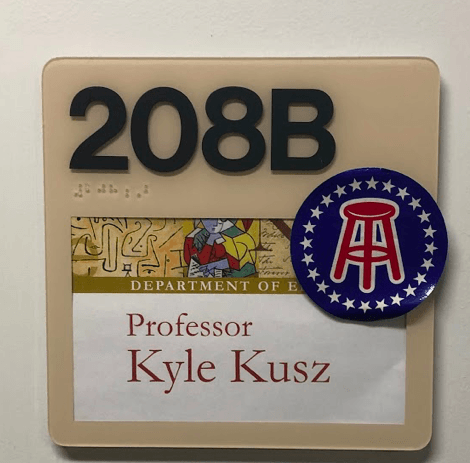In protest against a book written by Professor Kyle Kusz, someone left a barstool sticker on his name plate. Photo contributed by Kyle Kusz.
Numerous media outlets across the U.S. reported Kyle Kusz Called Tom Brady a White Supremacist
During September, several news outlets reported that an associate professor at the University of Rhode Island called Tom Brady and his supporters white
The reports were based on a chapter Professor Kyle Kusz wrote for the Handbook of Sport and Masculinity. In this, he examines sport celebrities as complex cultural symbols that reflect the ideas about race, gender, age, class and nationalism that circulate at particular moments in history.
On Sept. 11, a reporter from the organization Campus Reform emailed Kusz to inform him that they would be running a story on his research. In an email to Kusz, the reporter mentions how she was intrigued by his article as she recently moved to New England from California and found the Tom Brady phenomenon to be strange.
Campus Reform describes itself as a conservative watchdog to the nation’s higher education system. According to its website, its mission is to expose liberal bias and abuse on college campuses.
“I knew what was coming: a misleading story intended to generate click-bait and energize those who dislike talk of white, male privilege,” said Kusz. “Well, the article accomplished both.”
On Sept. 26, Campus Reform posted an article claiming that, in his chapter, Kusz insinuates that Brady owes his popularity to “white rage and white supremacy” that has emerged in America as a reaction to the Obama presidency. The article was quick to pick up attention, particularly among media outlets such as Fox News and Breitbart, as well as political commentator Rush Limbaugh.
College students mostly learned about the report from Barstool Sports, a sports and pop-culture blog founded by David Portnoy.
“Football is supposed to be about bringing people together, so to paint Brady as a villain is just ridiculous,” said senior writing and rhetoric major, Michaela Sullivan. “That’s part of living in New England, we worship Tom Brady. But to say it has something to do with race is missing the mark.”
For the last four years, Kusz says he has been trying to make sense of how President Donald J. Trump has long used sports to create his brand, how candidate Trump used a number of controversial white sportsman as racial dog-whistles to signify his authoritarian tendencies while campaigning in 2016 and the ideas about race and gender that seem to connect him to others, whether that be the alt-right or Tom Brady.
However, Kusz said many media outlets took his words out of context.
“In no way do I believe that Tom Brady is a white supremacist or that his popularity is due simply to white supremacy,” said Kusz.
In an article featured in the Providence Journal, Kusz describes how his interest in Tom Brady has always been aimed at trying to make sense of the ideas that inform, and the meanings that result, from cultural representations of him.
“Mr. Brady, of course, is not responsible for how others take up his image,” Kusz said. “But to study how and why the images of a sports star like Brady are being used symbolically and politically is a legitimate and important subject today, and that’s what I do in my work.”
Despite Kusz’s intentions, most of the media attention his work has received has caused anger and disdain for URI itself.
“I am proud to be a fan of Tom Brady,” said one 2006 URI graduate in an email to The Good Five Cent Cigar. “I am ashamed to be a University of Rhode Island Alum.”
Many speculate that Kusz wrote the chapter to promote his brand and get fame, but Kusz stresses that this is not the case.
“I would like people to know that I did not seek the spotlight for this work,” Kusz said. “Campus Reform chose to put my work under a microscope for political purposes. I had no way to keep them from publishing their article. Additionally, I did not receive a single penny for writing that chapter. Just so the public knows: few academics, if any, get rich in academic publishing.”
Something Kusz did receive from the attention of his chapter was an influx of hate-filled emails and voicemails, with some including death threats. The attention put a lot of stress on Kusz and his family, as well as the URI English Department.
“I would like to sincerely thank Travis Williams, Rosaria Pisa, Dean Jen Riley, URI Detective Mark Brasil, my colleagues in English and others across campus for their support,” said Kusz. “Another good thing to come of all of this was receiving emails from former students who expressed their support and appreciation for the impact our classes had in how they see and think about the world around them years later.”
Although Kusz’s research was not taken as he anticipated, he does not regret writing the chapter.
“I think studying sport and celebrity can reveal important insights into culture, society, and politics at different times in history,” said Kusz.

